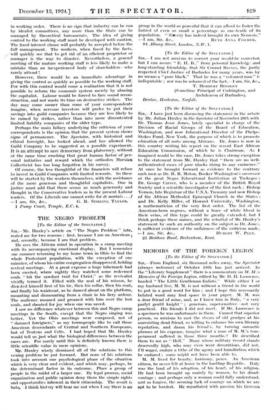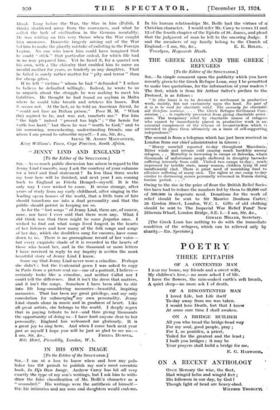MEMOIRS OF THE FOREIGN LEGION
[To the Editor of the SPECTATOR.]
Sta,—From England, six thousand miles away, the Spectator (always welcome) of October 18th has just arrived. In the "Literary Supplement" there is a commentary on M. M.'s Memoirs of the Foreign Legion, edited by Mr. D. II. Lawrence, headed " The Little Gentleman Enlists." While either I or my husband live, M. M. is not without a friend in the world to put in a good word for him ; and I hope this necessarily belated word may find space in your paper.. M. M. was a dear friend of mine, and, as I knew him in Italy, " a very parfyt gentil knight " ; generous, supersensitive—not very practical. His friends I did not meet. If Mr. Lawrence is a specimen he was unfortunate in them. Cannot that superior person, so anxious to cast the stones of old grudges at his unresisting dead friend, so willing to enhance his own literary reputation, and damn his friend's, by turning sarcastic phrases at his expense, imagine what a man of M. M.'s tem- perament suffered in those three months ? He described them to me as " Ik11." Many whose military record stands deservedly high, who may even wear decorations, did not, I'll wager, endure a tithe of the agony and humiliation which he endured ; some might not have been able to.
M. M. lived for beauty, harmony, peace. An American citizen, lie never felt at home in the hustling Republic. Italy was the land of his adoption, of his heart, of his religion. He had been brought up mainly by women, to his disad- vantage ; and perhaps only a woman could fully understand, and so forgive, the seeming lack of courage on which we arc apt to be hardest. He repudiated with passion his German
blood. Long before the War, the Slav in him (Polish, I think) shuddered away from the coarseness, and what he called the lack of civilization in the German mentality. lle was writing on this very theme when the War caught him unawares. Domestic tragedy arising out of the War led him to make the ghastly mistake of enlisting in the Foreign Legion. No one who knew him could have imagined that he could stick " that particular ordeal, for which life had in no way prepared him. Yet he faced it, for a quarrel not his own, with a like chivalry that enabled him to nurse an invalid mother for years, as tenderly as any daughter. That he failed is surely rather matter for " pity and terror " than for cheap gibes.
If he left " victims " whom he had " defrauded " I refuse to believe he defaulted willingly. Indeed, he wrote to us in anguish about the struggle he was making to meet his liabilities. He thought he had found an asylum in Malta where he could take breath and retrieve his losses. But it seems not. At the last, as he told an American friend, he " could not face an Italian prison." Poor M. M. " What (he) aspired to be, and was not, comforts me." For him " the high " indeed " proved too high " ; " the heroic for garth too hard," but these he was " worth to God," and to his sorrowing, remembering, understanding friends, one of whom I am proud to subscribe myself.—I am, Sir, &e., IRENE M. ASHY MACFADYEN.
King William's Town, Cape Province, South Africa.



























































 Previous page
Previous page